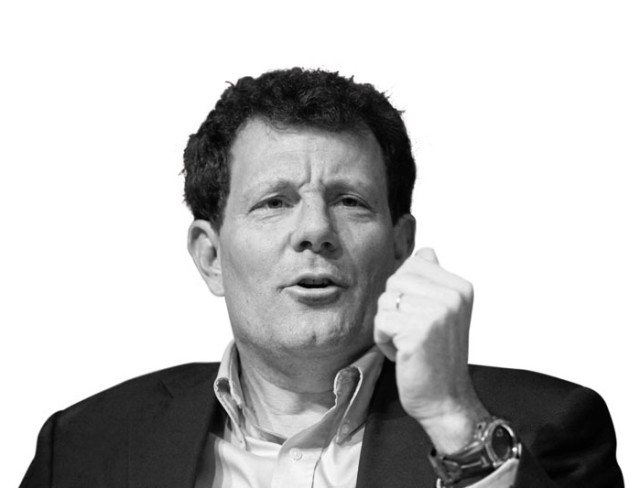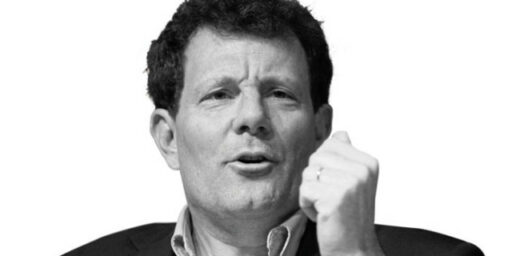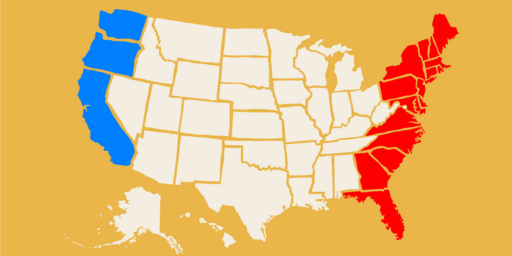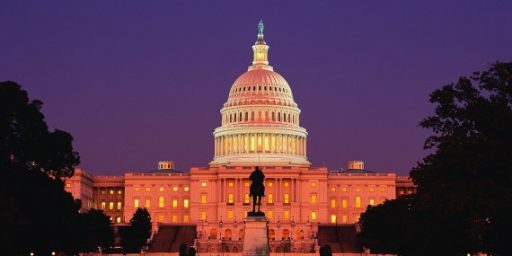Nicholas Kristof Is Exploring a Run for Oregon Governor
The two-time Pulitzer winner is considering a career change.

The hyper-local Willamette Week has reported and the New York Times columnist has confirmed that he is considering a run for chief executive of the Beaver State, where he grew up but hasn’t lived in four decades.
Nicholas Kristof, the two-time Pulitzer-winning columnist for The New York Times, is considering a run for Oregon governor.
In recent days, a poll includes Kristof’s name and asks voters how they would feel about a journalist who grew up on a farm running for office. The poll also includes other Democratic hopefuls. Kristof was raised on a sheep and cherry farm in Yamhill County, about an hour southwest of Portland.
Contacted about the poll, Kristof says his friends are attempting to recruit him. “I have friends trying to convince me that here in Oregon, we need new leadership from outside the broken political system,” he tells WW. ”I’m honestly interested in what my fellow Oregonians have to say about that.” “All I know for sure is that we need someone with leadership and vision so that folks from all over the state can come together to get us back on track,” he adds.
Now, Kristoff seems like a decent guy and he’s bright and accomplished.
Kristof, 62, who attended Harvard and was a Rhodes scholar at Oxford, is perhaps best known for his columns on international human rights abuses, including sex trafficking, sweat shops and child marriage. He won an international reporting Pulitzer in 1990 (along with his his wife, Sheryl WuDunn) for covering the Tiananmen Square protests in China, then another Pulitzer for commentary in 2006 for columns on genocide in Darfur.
Still, that hardly seems like preparation to run a state where he hasn’t lived since childhood. But perhaps we should have seen this coming:
[L]ast year, he and WuDunn authored a book, Tightrope, on the failures of the American dream, focusing in part on the stories of childhood friends from Yamhill County, many of whom fell into poverty and drug addiction.
WW published an excerpt from Tightrope early in 2020. In an interview with WW then, Kristof said both political parties had abandoned the working class to despair and early deaths. “This is not just a Trump problem or just a Republican problem,” he said. “Both parties over 50 years have their fingerprints on policies that were disastrous for a lot of working-class Americans. Mass incarceration is one example.”
I know very little about Oregon politics but am skeptical that its blue collar voters are clamoring to be led by a Ivy-educated NYT columnist whose only connection to them is his inheritance of a cherry orchard that he grew up on. But this may be a propitious time to strike:
The Democratic primary for governor, only the second in more than two decades not to include an incumbent or former governor, is wide open. Yet an outsider may still face an uphill battle.
State Treasurer Tobias Read, Multnomah County Chair Deborah Kafoury, Service Employees International Union leader Melissa Unger, Oregon House Speaker Tina Kotek, state Attorney General Ellen Rosenblum and Labor Commissioner Val Hoyle are among those weighing a run in the Democratic primary.
As an outsider, that hardly sounds like a murderer’s row of opposition. There’s no US Senator, Congressman, or even lieutenant governor in the mix. But they’re likely to be more in touch with the state of Oregon politics than Kristof.






Kristof has used reminiscences of growing up in Oregon as a jumping off spot for several columns in recent months to explain the plight of the white, working class to NYT’s readers. I suspect that the type of Oregonian gently skewered by Portlandia, has decided that Kristof’s proven progressive credentials and liberal populism is just the type of candidate the state needs. But a career in journalism with a focus on punditry isn’t a good background for a governor and you’re right that even holders of minor state offices are likely to have a better understanding of the issues facing the state.
Native Oregonian here and involved in party politics at the local level. Have followed Kristof for years, and I believe that he has kept his rural Oregon self-identity. His strongest point is ability to do root problem analysis and find proposed solutions. That said, he has no executive or legislative experience and a long paper trail. I support him running–it will be good for the Democrats to have a intense primary to expose candidates’ strengths and weaknesses–but don’t know if I will vote for him. He would, and I think this is a positive, be more moderate than some potential candidates.
Enough with the celebrity candidates. It’s an insult to the job of being a governor that someone with no experience thinks he can do it. We’ve had enough lessons in the high price of inexperience (Trump, Bush Jr., Ventura, Schwarzenegger, Palin, etc. etc.). Stop these hubristic fantasies now. If we think that government has any power whatsoever to improve the lives of Americans, we should laugh the Oprahs and McConaugheys and Kristofs off the public stage.
We don’t need an official American version of a cursus honorum, but come on already.
What @Kingdaddy: said.
I’m not sure that’s the right background for Governor.
@Gustopher:
Okay, that made me laugh out loud.
@Kingdaddy: I’m going to push back against this. There have been plenty of examples of celebrities who have entered politics and served with distinction–Sonny Bono, Bill Bradley, Al Franken, among others. Hell, if we’re honest with ourselves even famous astronauts who have entered politics, from John Glenn to Mark Kelly, weren’t any more conventionally qualified than the other “celebrities” you deride, though we tend to view them more favorably than we do actors or wrestlers.
Politics is not brain surgery; experience helps, but it isn’t absolutely necessary in order to be competent at the job. You talk about Bush and Palin, but you neglect to mention someone else who was derided as too inexperienced for the job: Barack Obama. (Or, for that matter, Abraham Lincoln.) As I’ve stated before, the problem with Trump wasn’t his inexperience but the fact that he’s a stupid, ignorant, two-bit con artist. If he’d come to the office with real experience under his belt–say, governor of NY–I’d fully expect his presidency to be every bit as big a disaster as it was in the real world. He spent four years as president and by all accounts learned absolutely nothing. Describing Trump’s problem as inexperience is really missing the point for a man who’s literally unteachable. His failure as president isn’t an indictment of businesspeople who never held office, since on top of things he’s a lousy businessman. You think that, say, Warren Buffett or Bill Gates would have made an awesome mess of things had they been president? I personally doubt it–though at the very least it’s untested.
From what I’ve seen over the years, people use “inexperience” as a kind of Rorschach test. For example, whenever they criticized Obama’s performance as president they’d attribute his mistakes to inexperience even when these included things countless other presidents have done. If you go through history, you find very little obvious correlation between how experienced a president was and how successful they were at the job–yet people who strongly believe in the importance of experience have a tendency to see what they want to see.
Woodrow Wilson came to the presidency with two years as governor of New Jersey, which by ordinary standards would be considered a pretty thin resume. He was kind of an expert on politics–but as an academic scholar, not as someone who had practiced it on the ground. Now, of course, Wilson has a mixed legacy and plenty of things we can criticize about it (not the least of which is his racism), but that doesn’t prove that his faults were due to inexperience.
That’s probably the closest analogy I can think up to someone like Kristof, whom no one would accuse of being ignorant of politics. He is certainly not someone I’d turn to as a candidate, and I’d have a preference for people with prior experience in office, but I’d be open to giving him a look if I lived there. A lack of direct on-the-ground experience can be overcome by taking the time to learn about the job, and a lot more turns on basic character and judgment than you are acknowledging.
@Michael Reynolds: Ditto your ditto
@Kylopod: This is a senior executive level experience, not a legislative one. He has zero executive experience. Zero.
@Kingdaddy: And Reagan. And the idiot football coach senator whose name escapes me at the moment.
I am reminded of an article years ago about HW Bush. Said he went to Houston and campaigned as a hard core right winger, then returned to Washington and did what he thought best, and saw no connection between the two activities. Elections and governance aren’t the same thing.
The other side is getting bad people elected with their celebrity. If we got a few good people elected the same way I wouldn’t bemoan that there might have been better people who were career pols. The old thing about perfect being the enemy of good.
Some years ago, Steven Dubner in the Freakonomics podcast, did a short series on CEOs. One thing that came up more than once, is that CEOs spend far more time managing the company than setting up or implementing their vision, if any, of what they want the company to do, of making grand strategic decisions and policies.
I wonder how true that is of politics in executives roles, like mayor, governor, or president.
@MarkedMan:
Neither did Obama prior to becoming president. Do you hold that Obama (or Abe Lincoln!) was unqualified for that job?
There’s very little of the abstract or theoretical in being governor. There’s very little of the anecdotal and personal in being governor. There is a whole lot of schmoozing, arm-twisting, horse trading, bullying, pleading and compromising. Kristof is a writer whose specialty is elevating the personal narrative to illustrate a larger problem. He’s a pedant. His work environment has been the New York Times news room.
The issue is not that this or that person accused both men of being inexperienced. Neither Lincoln nor Obama are good analogies because both were lawyers, both were politicians, they’d been swimming in that polluted sea for a while.
One more thing: I am squeamish about the whole idea of journalists becoming politicians. It casts a partisan shadow on the whole profession, making it irrefutable that at least this member of the MSM is a Democrat. I grant that’s weak given the way Fox News people cross the line on the daily.
@Kylopod: ” Do you hold that Obama (or Abe Lincoln!) was unqualified for that job?”
It’s pretty disingenuous to keep using Lincoln as one of your arguments here. The government, and the nature of governing, has changed a lot in the last 150 years .
And Sonny Bono? He was a joke even to his own party in congress. He once famously complained that all the bills being passed were “in legalese,” until one of his colleagues explained to him “yes, because we are writing laws.” He only became popular after he discovered the way to make friends in congress was to raise a lot of money for people — one thing he was very good at. The day his seat — later occupied by his widow — finally went blue was a joyous occasion in the Coachella Valley.
@Michael Reynolds:
That’s a legitimate point (and I happen to think a lot of people overlook Obama’s eight years in the statehouse when discussing his experience), but my problem is that when people talk about experience they don’t define what they mean and rely on shifting, amorphous criteria while acting like they’re using an objective, easily definable concept. Just look back on this thread where people starting talking about “celebrities” like Trump and Arnold and Jesse Ventura–and, then, Palin? Bush? Reagan? Sure, Reagan was an actor, but by the time he became president he had eight years as governor of CA under his belt. I’ve got plenty of criticisms of his abilities as president (separate from my criticisms of his policy agenda), but very little of it is something which could have been remedied by greater experience, and had to do with deeper issues of character (and to some extent his early Alzheimer’s, though we didn’t know about that till later). When you argue against celeb candidates and the first ones you mention are the above people while ignoring the various politicians with celeb backgrounds who were at least okay at their job, you’re stacking the deck, because what you’re really pointing to in those individuals isn’t lack of experience but deeper issues of character, competence, and seriousness.
Even that term “character” is a bit slippery, because people tend to associate it with morality and integrity, which I believe are important but don’t necessarily mean a politician can’t be effective at the job. What I mean when I talk about character is more the set of character traits needed to do the job of politician effectively. Some of those traits are honed through experience in public office–but some people are gifted at it naturally, and some will never get good at it no matter how long they’re doing it. And when looking in a fair-minded way at the range of politicians over the years with non-political backgrounds, it’s really hard to make any generalizations.
@Kathy: From watching the sausage get made, I can verify that in at least one corporation with 11 digits of revenue, the CEO had astoundingly little power for fundamental change. And damned little budget too.
Setting aside a few very visible exceptions, CEOs of modern corporations are merely They did not get there by taking big risks and innovating. They got there by understanding what their bosses want, crafting a vision of the possible, creating a solid and well documented plan, and then executing efficiently. Admirable things, but don’t confuse them for innovators and entrepreneurs.
@Kylopod: There’s a huge difference between being an effective legislator and an effective executive. I don’t doubt that a Sonny Bono can go from being a singer to a member of Congress, learn the ropes, and be effective. I have very big doubts that he could have been an effective governor of California. Being a governor requires an ability to run a large organization, know how that organization works, work with the other branches of the state government, and work with other levels of government, all at the same time. A much different level of challenge.
Reagan at least had experience in party politics, a history of working within the political coalitions who would support him, the backing of a lot of right-wing California notables, and some experience in a version of retail politics through his terms as SAG-AFTRA president. Was he a good governor of California? Not in my opinion, but others may have a different opinion about his effectiveness.
I would not choose Woodrow Wilson and Barack Obama as examples of presidents who overcame their inexperience. I think, on balance, Obama did OK. However, I don’t think he fully understood the bully pulpit, or other less formal powers of the office, especially during his early years in the White House.
@MarkedMan:
I suppose it depends on how accountable a CEO is to the board of directors, and how much stock the CEO owns.
Founders who act as CEOs are different in principle from latter hires to the post.
I’ve long held that the only things that are predictable in the governorship (and, especially, the presidency) are: one (two, if you’re lucky) legislative initiative to be seen through; and one (two if you’re unlucky) crises. The governorship is where we should be sending folks who have some sense of vision (legislative initiative) and where they can get experiences handling crises (natural disasters are a perfect place to start). I don’t know how a journalist passes muster for a Senior Executive position like a governorship….
**Incidentally, I think that “How do you handle crisis/crises? Give examples from your work experience” should be question number 2 and 2(a), in gubernatorial and presidential vetting.
Question number 1: “Who is buried in Grant’s Tomb?”
@Michael Reynolds:
One more thing: I am squeamish about the whole idea of journalists becoming politicians. It casts a partisan shadow on the whole profession, making it irrefutable that at least this member of the MSM is a Democrat. I grant that’s weak given the way Fox News people cross the line on the daily.
I could not agree with you more. See James Fallows’ Breaking The News for how chummy journalists have become with politicians, to the detriment of both journalism and politics. A journalist running for a political position just blurs the line even further, or helps erase it altogether.
@Kingdaddy: The first paragraph in the previous comment included Michael’s words, not mine. The fickle editing function seems to have swallowed my formatting.
@Kingdaddy:
You’re shifting the goalposts. Your original comment said nothing about executive vs. legislative positions–you simply said “Enough with the celebrity candidates.” If you’re suggesting now that someone without executive experience can’t make an effective governor or president, well that really has nothing to do with celeb candidates in particular, and there are too many counterexamples to even list here.
I should note here that I am not saying I want there to be more celebs entering government. It’s just one more sign of the inequities in America, how you can get ahead through the privilege of your preordained position in society, and it tends to be especially noticeable when people from the entertainment world enter politics, where there’s often more than an aura of unseriousness, like Reagan quoting a Clint Eastwood character or Arnold quoting the Terminator.
But that doesn’t mean I’m ready to make some hard rule (unofficially I mean) barring any celebs from office ever again. As an analogy, it’s like the problem of political dynasties, which have certainly given us mediocrities like Dubya but which have also produced remarkable individuals like FDR. Speaking broadly, I would like to see an end to such dynasties, but I’m also not automatically going to dismiss someone who happens to be from such a dynasty.
Now right there is a perfect example of what I was talking about–how people who believe in the importance of experience tend to see what they want to see. Obama made heavy use of the bully pulpit during his presidency, barnstorming the country to sell his agenda, and indeed one of the prime criticisms I remember was that he was overexposed. If your argument is that he didn’t communicate his policy goals very effectively, then I agree–but the same is equally true of pretty much every Democratic president in the modern era, starting with Carter. Democrats are addicted to complexity and nuance, and tend to fair poorly at branding, exactly the areas where Republicans excel. It’s a Democratic Party problem, not a weakness of Obama or any other Democratic politician per se.
@Kylopod: Did I hold that Obama was unqualified for the job? Yes. I did. In general I don’t think people who have never run an agency or a city or state are a good risk for jumping directly to Governor or President, or even big city Mayor. Congress critter is not good training as they are explicitly not responsible for execution. (And I also think business leadership is a very poor springboard for government service in general.) I did give Obama some credit for directing a successful community organization, but that was pretty small potatoes.
In the end, I voted for him over Hillary Clinton in the primaries, despite thinking her credentials were much better. It came down to three things, 1) my gut, 2) the fact that he was surrounding himself with talented and experienced people and listening to them and crediting them, and 3) the intangible that I felt that with the Republican Party going to darker and darker places, having a Democrat who presented optimism so well was a huge plus.
So I was happily surprised how well Obama did, but I have no illusions. It was a risk. He wasn’t qualified or proven, but in the event he did very well.
I gave some thought to McCain, but he also had no executive experience, and I had long thought him to have a reckless streak. Once he selected Palin there was no chance I would vote for him.
@Skookum: “His strongest point is ability to do root problem analysis and find proposed solutions.”
Nope.
BTW, ‘find proposed solutions?
What does that mean?
@Kathy: You would be astounded at the power that corporate advisors such as McKinsey or financial analysts have in how a company is run. The trashing of product quality in the US in the 70’s and 80’s in company after company, industry after industry had a lot more to do with the Harvard MBA’s staffing McKinsey then it did with thousands of individual CEO’s simultaneously deciding they were spending too much on making their products last.
The outsourcing of engineering to India or production to China was similar. I worked with a guy who would have been tasked with moving our production to China if we were operating in the environment of even 10 years earlier. He confided to me over drinks at the lounge in the Shanghai JW Marriot how relieved he was that pressure was quickly fading. He observed that while McKinsey had helped write thousands of grand plans detailing the incredible savings of moving production to China, as far as he knew no one had ever authorized a post facto analysis of how that turned out. He opined that if they thought it would show anything that could be spun as a positive, those studies would have been done and books written.
The engineering India thing is only starting to fade. Suffice it say that even with salaries and benefits at 35-45% of the US, by the time you account for increased overhead, lower productivity and high turnover, every project I know of that was done in India over the past 25 years was at best a wash, and usually a loss.
@gVOR08:
Reagan was a two-term governor of California, by far the largest state/economy in the nation. If that experience was inadequate, then only Nixon, HW Bush, and Biden have been qualified in my lifetime.
@Kylopod: I perhaps misused the term “bully pulpit” slightly. Obama was an effective communicator, but how he used that communication was more in the service of being a fox than a lion. You could count on Obama to be very clear and reasonable, almost too reasonable. He worked hard to persuade other people, but the ones who were resistant to persuasion weren’t sufficiently afraid of crossing him.
As for moving the goalposts, I disagree that I did that. I only pointed out that the experience gap between a celebrity and a governor is much bigger than the gap between a celebrity and a member of Congress, state senator, or many other legislative positions. The gap is still there, in both cases.
@James Joyner: Reagan certainly had the experience as an executive and, even more, his experience before that was diverse, which is a plus in my book. He also surrounded himself with generally competent people.
In the event, I thought his actual administration accelerated all the negative tendencies in our country. He built a competent administration but one that was geared towards accomplishing destructive things.
I accept the fact that you and I disagree on his level of intelligence, which was a disqualifier for me, even long before his cognitive decline was apparent.
@gVOR08:
The “idiot football coach” would be Tommy Tuberville, who was unable to name the three branches of the federal government correctly.
@Kylopod:
I know you were responding to Kingdaddy, but FWIW I have no objection to even celebrities running for the Legislature. I question whether they will be effective champions of their states or districts but that is true of virtually every non-incumbent.
@MarkedMan:
I kind of was at first, but as I read your comment it made more sense: bean counters count beans.
What I’m seeing in this discussion is that “I don’t believe that people in [category X] should run for [political office Y]” really only means “I don’t want to have to consider [person Z from category X] as a candidate.” It’s okay to believe that Nick Kristof shouldn’t be governor for no particular reason whatsoever. Sometimes visceral decisions are okay, folks. “Non sunt multiplicanda entia sine necessitate.”
@Michael Reynolds:
Appointments. If the governor has to go argue with the legislature’s budget committees, he/she appointed the wrong budget director. If he/she has to sit in front of the Natural Resources Committee and explained why the fire-fighting response was screwed up, he/she appointed the wrong head for the Department of Natural Resources. Depending on the state, eight to ten cabinet level appointees are going to do most of the heavy lifting.
@Kingdaddy:
But that’s a character issue rather than an experience issue. If it were reflective of lack of experience (presumably you mean executive experience, since as I mentioned he had 12 years of legislative experience), then this supposed weakness would have dissipated as his presidency went on. After all, there’s no better way to get prepared for being president than actually being president. Let’s put it this way: when starting his second term he had exactly the same amount of executive experience as any four-year governor, except his was more relevant to the job at hand, because it was from the job at hand. Yet the way you describe this criticism makes it sound like a static attribute.
@James Joyner: But Reagan got to be gov by being a celebrity. Prior to that I believe his only executive experience was as a union president.
@gVOR08: Yes, that’s fair.
If they profess good values, I don’t mind dummies in a legislature, as their staff usually does all the work. The executive is different.
@Barry: There is a difference between defining a problem and conceiving of a variety of solutions. Perhaps a better word would have been “possible” solutions rather than “proposed solutions. I was, BTW, a business systems analyst who dealt often with customers wanting to implement costly solutions without first defining the basic problems.
I’m not sure how many of the posters on this topic are truly tuned in to Oregon politics. We have most of the rural counties (about half of the land and a quarter of the voters) wanting to become part of Idaho because they don’t feel represented by the Democratic majority. These are not the old-timer Oregonians. These are transplants and those who identify more with conservative politics (think Amon Bundy and Trump) than being an Oregonian. I believe Nick Kristof would add an important voice to the Democratic primary in this regard.
No.
Kristoff is a sexual hysteric who has links to Far Right religious organizations and was a big supporter of “sex trafficking” fraud Somali Mam. He was big supporter of the disastrous FOSTA law and is now on a crusade, supported by Far Right orgs, to ban porn.
This man has no business anywhere near power.
Personally, I’m in favor of searching for unconventional talent for high office. For example, I can’t think of a better candidate for governor of Florida than Carl Hiassen (who was a few years behind me at UF).